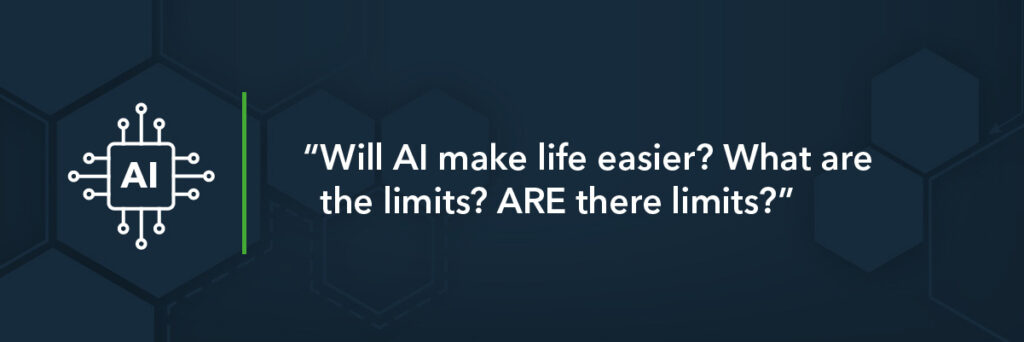
Artificial Intelligence has been around for decades now, but as it evolves and becomes more integrated into our lives, questions, possibilities, and concerns are being raised.
In 2001, which really wasn’t that long ago, the movie A.I. was released, and it helped many people understand parts of the AI process and its possibilities. The movie portrayed a combination of robotics, artificial intelligence and major science fiction technology while incorporating humanisation of machines to help audiences better understand the impact and possibilities of AI.
This in turn set the stage for how we relate to this type of advancement. Just 20 years after the release of this movie, which was most definitely both futuristic and science fiction, that fiction has become fact: humans have spearheaded technological advancement to a point that AI has now become part of our daily lives and has become so mainstream that no one really flinches when AI is mentioned.
The vision of AI has rapidly advanced and is now used in even the simplest of tasks in both the workplace and our personal spaces.
In some instances, what is technically AI technology has become so commonplace that it is no longer referred to as such, and the expectations of ‘AI’ have become more sophisticated. For example, we expect social media platforms to automatically identify individuals in our pictures as we upload them. This was once a feature that made most humans feel uneasy.
However, as AI is used more and more, questions are also being asked: is AI coming for our jobs, our livelihoods, and how will it affect our lifestyles? Will it make life easier? What are the limits? ARE there limits?
Three significant concerns regarding AI have emerged:
1. Human reaction
With regards to the human reaction to AI, a lot of the concerns raised have been around the fact that people are afraid of AI because they don’t understand it. That argument can, however, be extrapolated retroactively with other technology – ‘I don’t know how a car works but I use it without fear.’ While not a new concept, individuals particularly grapple with change in the technological spaces, often basing their feelings on what particular systems can do for them.
2. Lack of regulation
Currently, many AI platforms are entirely unregulated and unchecked. If not controlled, this can compromise data particularly in payment spaces, play with user psychologically and even allow the creation of illegal content such as personality fraud. Government always takes time to catch up with new technology, and until it does there will be grey areas that unscrupulous entities can take advantage of.
3. Data collection
Currently, a major application of AI is data collection. Any output the user gets is often dependent on what the user shares with the program. Users therefore need to be aware that they are sharing their data when they are utilising these platforms or tools; the way they think, the way they process and the way they interact with it. It is possible that data collection can be done without consent, too, depending on the nature of the interaction on the platform or system. While it may not track every single detail about the user, their behaviour is monitored and used to improve their experience.
As with other forms of developing technology, when used correctly Artificial Intelligence can significantly improve our lives, as we are already experiencing. If we look at what has become available even in 2022, we can see that what we have to look forward to from this rapidly evolving sector can scarcely enter our imaginations. From tech industries, healthcare, finance to education and start-ups, we’re set to see a greater influence from AI. Here are some of the innovations that are particularly exciting:
Generative Artificial Intelligence
Recent developments in AI include Generative AI. Essentially, this means using AI to turn inputs such as text prompts, audio or images to generate content. Dall-e takes simple text prompts and converts it into original works of art, the Open AI playground uses a few words to generate complete poems and articles on any subject, and ExcelFormulaBot will build an Excel formula for you from some text instructions.
These developments are incredibly exciting, creating endless opportunities for entrepreneurs and small businesses, but also individuals. A small business can use Phrasee to develop a complete brand language for an entire marketing campaign with the help of AI or generate assets such as logos using looka.com.
This is definitely one of the most exciting and promising developments for AI.
Societal and environmental impact
As AI learns more and advances in its ability to interpret data, so it gives the opportunity for it to assist society. For example, accessibility to objective, neutral advice from AI is already becoming available in areas such as financial services, legal services, and career development. AI driven financial advisors such as Robo Adviser can provide unemotional, unbiased financial advice based on a person’s individual needs.
AI is already capable of giving solid data-driven guidance, and this is only going to increase. AI systems and tools are also primed to help us in vital industries like agriculture, where sensors will inform an AI system on growing conditions and allow for perfectly controlled microenvironments for plants. From food security to improved food quality through automated functions, these systems will have immense forecasting capabilities based off the information we provide.
Everyday life
What was once only science fiction is becoming closer to reality and will create a world of convenience thanks to automations and AI. As our basic needs are catered for by AI, we will have more time and intellectual capacity to focus on the things that matter most to us on an individual level. These AI systems will help us with everything from payments to shopping experiences, healthcare to education. Ignition has embraced the use of AI to streamline our billing and payment systems to great effect and take our customer engagement journeys to the next level. Our AI driven platforms open up a world of opportunity and allow us to tackle challenges in the realm of payments and customer engagement in new and innovative ways, augmented by AI.
Conclusion
As Technology Director of a company as technologically driven as Ignition, I am incredibly lucky to be able to work and play in this field. We are at the forefront of developing AI tools and systems to improve the way we do business, and I get to bring our visions to life with our pioneering development teams.
If we look at how far AI has come in 20 years, it is reasonable to say that we can’t imagine how AI will look in another 20 years. Our lives will be vastly different to what they are now, and AI will be dominant factor in every sector of daily life. It is such a stimulating field, and there has never been a more exciting time to be involved in it.
Bhavna Namlal is Technology Director at Ignition Group.


